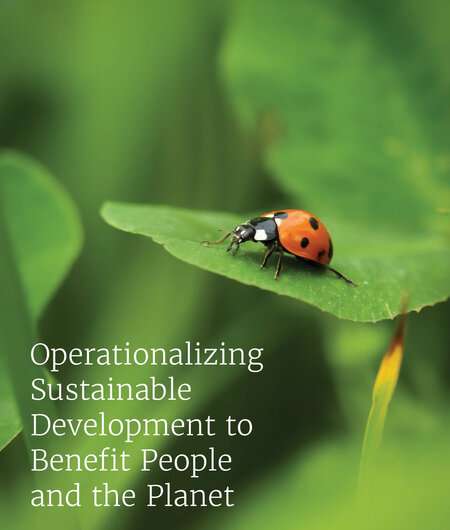Q&A: Ukraine conflict 'hindering SDGs progress'

Crises and conflicts are blocking science collaboration and sustainable development goals (SDGs) progress, says U.S. scientist William Colgazier.
At the midway point to the UN Sustainable Development Goals' 2030 target, the world is startlingly off track to meeting the global framework to end poverty, protect the planet and ensure all people enjoy peace and prosperity.
SciDev.Net sat down with U.S. physicist William Colglazier, a co-author of the U.S. National Academies of Sciences, Engineering and Medicine's new report, which maps priority areas for research and key actions required to support the SDGs.
Drawing on his experience working in scientific research and advising U.S. secretaries of state on science and technology, Colglazier traces major political obstacles, such as the Russia-Ukraine conflict, to meeting the Global Goals. He says international and collaborative education, research and science are vital to turning the tide on disappointing SDGs progress.
What are the report's main findings?
The report, "Operationalizing Sustainable Development," focuses on action. How can we take the inspirational rhetoric of the SDGs and turn it into action at all levels? It looks not just at the national level but at sub-national stakeholders: the private sector, universities and civil society.
The report overviews key research topics that require investigation and possible actions to help achieve sustainable development. It highlights eight interrelated themes: education and capacity building; localization of the SDGs and indigenous knowledge networks; food systems; urbanization; decarbonization; science, technology and innovation; science and peace; and financing to achieve the SDGs.
What standout solutions emerged from your analysis?
The Education and Capacity Building theme contains important examples. The Smithsonian Institute has focused on improving Science, Technology, Education and Mathematics (STEM) education by delivering inquiry-based learning. This involves having children be little scientists and figuring things out. The approach helps children and teachers explore community issues and better understand how these issues fit into the larger Sustainable Development Goals framework. The next generation will be key to solving the goals. The best way to get them involved is for them to understand the issues they know in their own community.
Carnegie Mellon University created its own "Voluntary University Review," [which models the work of countries to self-report on progress towards the SDGs]. Irrespective of discipline, students and teachers look at how their university can contribute to the SDGs. There are only a couple of countries which have not done a Voluntary National Review. One of those is the United States. It's strange bedfellows are Haiti, Myanmar, Yemen, and South Sudan. Cities and universities conducting voluntary reviews can stimulate efforts at the national and political level.
Is a lack of shared understanding on how to achieve the SDGs in practice the main challenge to meeting the global goals?
It is one of the main challenges. The other main challenges are now crises and conflicts. Russia's invasion of Ukraine and the pandemic make SDGs progress much more difficult. Conflict disrupts sustainable development and science and technology plans more than anything else.
The report identifies flagging multilateralism as a challenge. Can research play a role in boosting global cooperation?
For the last three decades, scientist-to-scientist collaboration has grown exponentially in almost every scientific field. In the U.S., there's been a realization that international scientific collaboration is key to advancing science. The number of young Chinese students in the U.S. was growing fast. There were many great collaborations between U.S. and Chinese scientists.
The current challenges between the U.S., China, and Russia affect international scientific collaboration. Governments are putting up roadblocks. This will affect how fast science moves. Science and technology can't pull rabbits out of the hat, but in some cases they can enable politicians to leap over what seem like intractable difficulties. This is key to accomplishing the SDGs.
Do you have examples where a lack of scientific collaboration is impacting SDG progress?
It is currently impossible for western and Russian scientists to collaborate [due to the Ukraine conflict]. From CERN to the ITER Fusion Facility and joint space missions, the impact is huge. The U.S. government was very concerned by some cases of inappropriate behavior by the Chinese in terms of stealing technologies, for example. I think it is a little bit overblown.
U.S. scientists and the government reacted to Chinese behavior by imposing new restrictions. Fundamental research that dealt in areas represented by technologies that might have security implications—artificial intelligence, robotics, big data, gene editing—was, before getting to technological application, totally internationalized up to now.
The issue of security versus international scientific collaboration is a big challenge right now. My solution to this problem is more face-to-face meetings between the leaders of science, focusing on making sure everyone understands the norms and practices that are essential for international scientific collaboration.
What are the areas where scientific progress is most likely to be hampered due to a lack of collaboration between scientific communities?
We've all been surprised by how fast the scientific revolution is occurring. I think this will continue. Technologies like Artificial Intelligence concern politicians. They recognize the great benefits they can offer societies but also that they can be harnessed to create difficulties.
Not sharing advances in some fields will hamper big breakthroughs that can help us deal with our shared challenges. With fundamental basic research, the general rule has been that it should be published in the open literature. If anything is truly security-related, it should be classified and restricted. Now there is a move to create new categories of restricted areas of research that were in the past completely open. This trend bothers me. It could end up slowing down the scientific revolution.
Provided by SciDev.Net




















